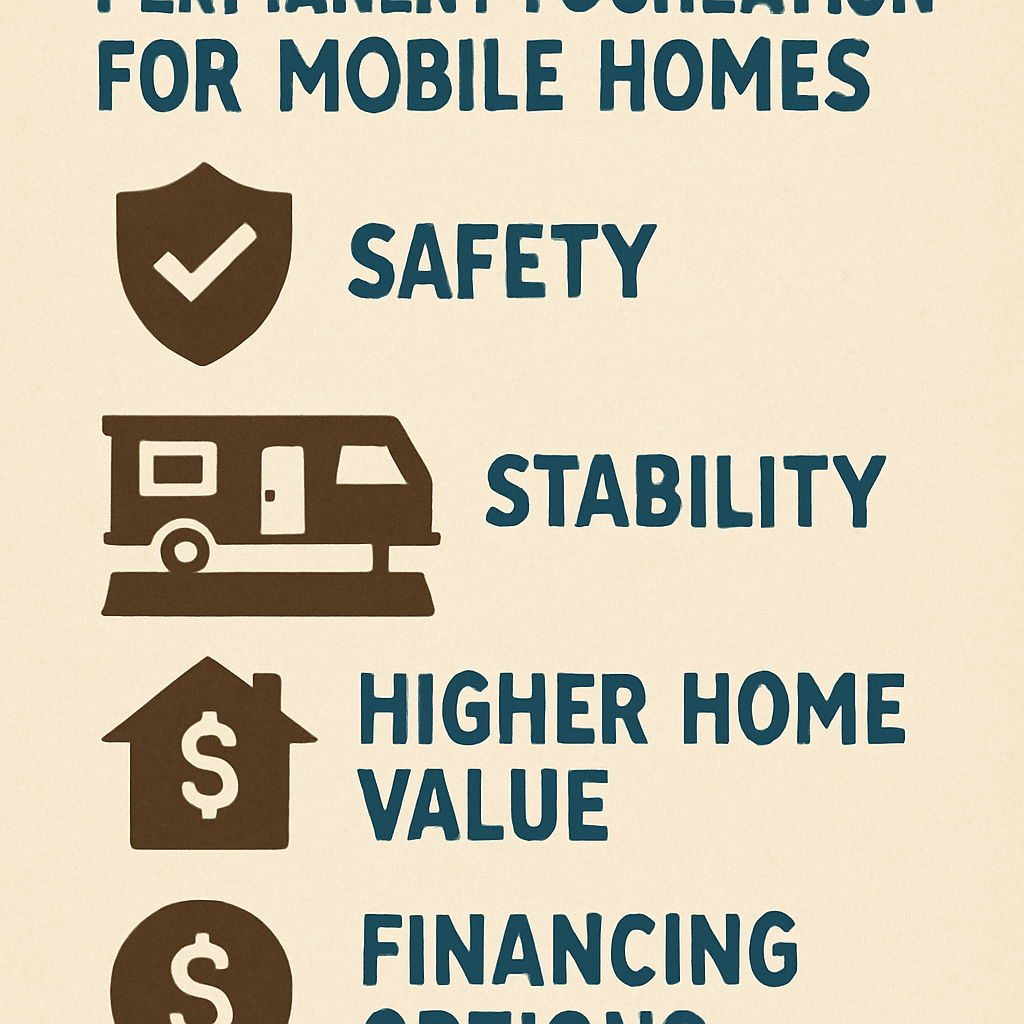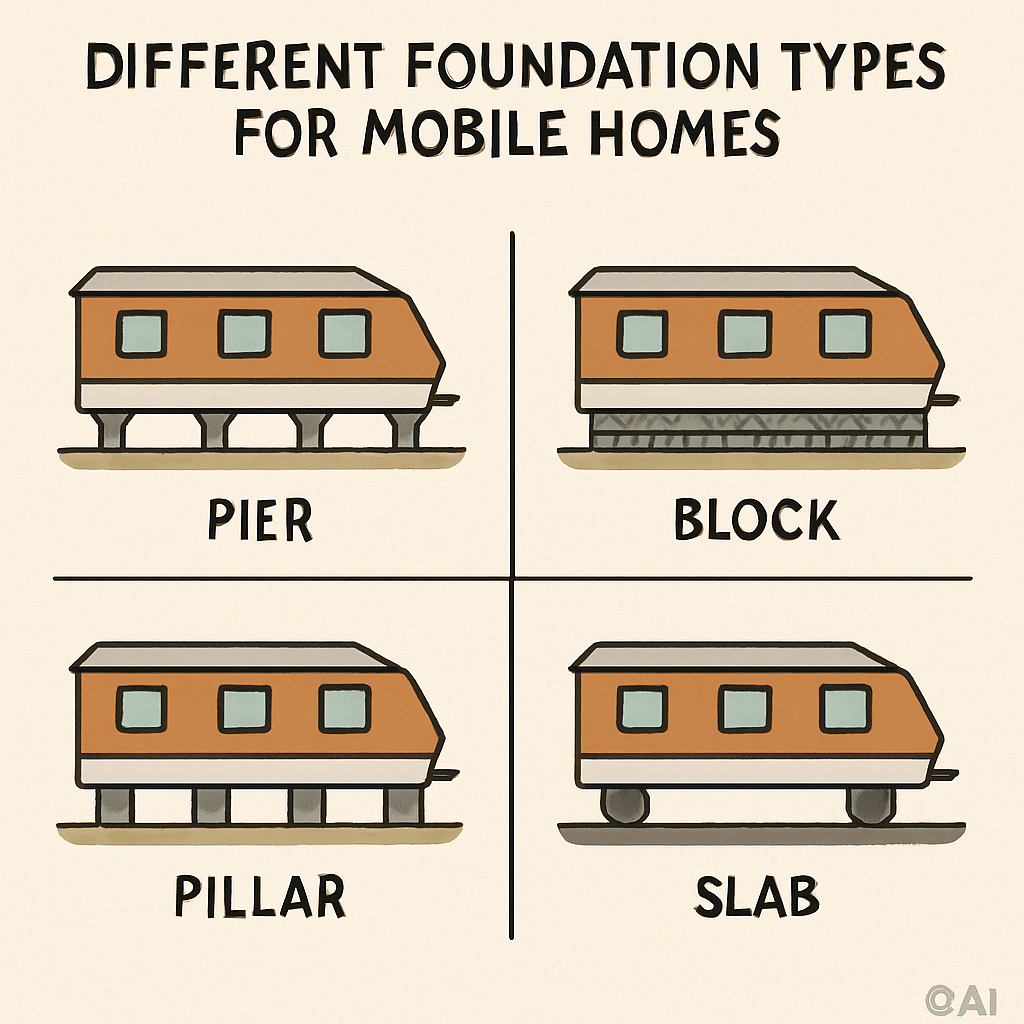How to Convert a Mobile Home to a Permanent Foundation Step-by-Step Guide with Costs Permits
Converting a mobile home to a permanent foundation can be a game-changer. It boosts property value and stability.
This process involves more than just laying concrete. It requires careful planning, permits, and compliance with local codes.
Understanding the types of foundations available is crucial. Each type has its own benefits and costs.
This guide will walk you through the conversion process step-by-step. You’ll learn about costs, permits, and potential challenges.
Whether you’re a homeowner or investor, this guide will help you make informed decisions. Let’s get started!
Why Convert a Mobile Home to a Permanent Foundation?
Converting a mobile home to a permanent foundation offers numerous benefits. Firstly, it significantly increases property value. It also adds stability to your home.
Moreover, a permanent foundation can make your mobile home eligible for traditional mortgage financing. This opens doors to more lending options.
FHA compliance and HUD standards often require a permanent foundation. Meeting these standards ensures your home is both safe and secure.
Here are some major reasons to consider conversion:
- Increased property value
- Eligibility for traditional financing
- Enhanced home stability
- Compliance with FHA and HUD standards
These benefits can lead to reduced insurance premiums. They also increase the home’s appeal to potential buyers. Converting your mobile home can be a rewarding investment.
Understanding Foundation Types for Mobile Homes
Choosing the right foundation is crucial for your mobile home’s longevity. Each type offers unique benefits, suited to different needs. Understanding these options helps make informed decisions.
A slab foundation provides a sturdy base. It’s a popular choice for its simplicity. This type is cost-effective and requires minimal maintenance.
Pier and beam foundations offer excellent support in various weather conditions. They are versatile and can adapt to uneven ground.
Basement foundations add extra space for storage or living areas. While costly, they offer great functionality.
Consider these foundation types:
- Slab
- Pier and Beam
- Basement
Climate and soil conditions influence the choice of foundation. Professional advice can ensure the best match for your location. It’s vital to weigh the pros and cons of each option. A well-chosen foundation is crucial for the future stability and safety of your home.
Permits, Codes, and Compliance: What You Need to Know
Converting a mobile home to a permanent foundation involves more than construction. Compliance with local regulations is essential. Neglecting legal requirements can lead to costly fines.
Permits are typically required for foundation conversion. They ensure that your project aligns with building codes. Contact your local building department early in your planning process.
FHA compliance and HUD standards may apply. Following these guidelines can increase your home’s financing options. Don’t overlook these aspects—they’re crucial for long-term benefits.
Stay informed about zoning laws and environmental regulations. Key compliance aspects to consider include:
- Local permits
- FHA and HUD standards
- Zoning laws
Be proactive in understanding these requirements. Consult local authorities to ensure you adhere to all legal obligations. This diligence can save headaches later, making your conversion project smooth and successful.
Step-by-Step Guide: Converting Your Mobile Home Foundation
Converting a mobile home to a permanent foundation involves meticulous planning. This guide breaks down the process into manageable steps.
First, develop a plan that includes detailed schematics and a timeline. Understand your local building requirements. Permits and compliance checks should be scheduled early on.
1. Planning and Budgeting
Start with a comprehensive budget. This should consider all anticipated costs.
Allocate funds for:
- Permits
- Contractor fees
- Materials
- Unforeseen expenses
Planning ahead can help avoid financial surprises. A well-organized budget streamlines the entire project.
2. Site Preparation and Inspection
Prepare your site with care. Remove any obstructions and level the ground. This step is crucial for a stable foundation.
Conduct an initial inspection. Evaluate soil conditions and drainage. Address any concerns before proceeding.
Consider these preparation steps:
- Clear debris
- Level site
- Inspect soil
3. Foundation Installation
Choose a suitable foundation type based on your home’s needs. Options include slabs and pier and beam foundations. Hire a contractor with experience.
Install the foundation in accordance with local codes. Supervise the process to ensure quality and compliance. Maintain clear communication with your contractor.
Key foundation steps include:
- Selecting the foundation type
- Completing ground preparation
- Installing the foundation
4. Securing and Attaching the Home
Once the foundation is in place, it’s time to attach your mobile home. This step involves securely anchoring the home to the foundation. Proper attachments enhance stability and safety.
Tasks to complete during this phase:
- Anchor the home
- Ensure structural alignment
Use approved anchoring methods that meet local codes. This step ensures long-term durability and security for your mobile home.
5. Final Inspections and Compliance
Finally, undergo all mandatory inspections. Inspectors will verify that the foundation meets building codes and safety standards. Secure a certificate of occupancy as proof of compliance.
Checklist for final steps:
- Complete final inspections
- Obtain certifications
- Verify compliance
This comprehensive approach ensures your project adheres to all necessary standards and regulations. This diligence not only guarantees safety but also protects your investment.
Permanent Foundation Cost Breakdown
Understanding the costs involved in a mobile home foundation conversion is essential. The final expense can vary significantly based on several factors. Location plays a crucial role. Labor and material costs differ greatly across regions.
On average, the expense for a permanent foundation ranges from $5,000 to $20,000. This range considers the size of the mobile home and the chosen foundation type. Slab foundations are generally less expensive, while basement foundations can be costlier due to added complexity.
Consider these cost components when budgeting:
- Labor fees
- Material costs
- Permits and inspections
- Foundation type
Investing in a quality foundation increases the home’s durability and value. Balancing costs with quality is key for a successful conversion. Prioritize durability and local code compliance to avoid future expenses. By planning thoroughly, you can manage your budget efficiently while ensuring a high-quality foundation.
Common Challenges and Foundation Repair Tips
Converting a mobile home to a permanent foundation can present several challenges. Homeowners often encounter issues with soil conditions and weather delays. Addressing these challenges early can prevent costly repairs later on.
Foundation repair is sometimes necessary during or after the conversion process. Damaged areas, such as cracks or uneven settling, must be repaired to maintain the foundation’s integrity. Regular inspections help identify and address these problems promptly.
Here are some foundation repair tips:
- Consult a professional for severe issues
- Regularly inspect for cracks or shifts
- Maintain proper drainage around the foundation
Be proactive with maintenance to prevent future foundation issues. Proper drainage, inspections, and addressing minor issues early can save significant time and money. By staying vigilant, you’ll ensure your mobile home remains secure and stable on its new foundation.
Mobile Home Upgrades to Consider During Conversion
Converting a mobile home to a permanent foundation is an ideal time to make additional upgrades. These upgrades can enhance living comfort, increase energy efficiency, and boost property value.
Consider modernizing both the interior and exterior features of your home. Simple changes, such as new skirting or energy-efficient windows, can make a big difference. These modifications can improve both aesthetics and functionality.
Here are some upgrades to consider:
- Energy-efficient windows and doors
- Updated skirting for better insulation
- Modern kitchen and bathroom fixtures
by JESUS ECA (https://unsplash.com/@jesus_eca)
Upgrades made during the conversion process can improve resale value and living quality. Taking advantage of this time to make enhancements is a smart decision. Overall, these investments will enrich the overall appeal and efficiency of your home.
Frequently Asked Questions About Mobile Home Foundation Conversion
When considering a mobile home foundation conversion, many questions arise. Understanding the nuances can ease the process and ensure compliance.
One common question involves the need for permits and codes. Yes, permits are typically required to meet local zoning laws. Consulting with local authorities can clarify specific requirements.
The cost is another frequently asked question. The expense varies significantly depending on the foundation type and labor costs. Obtaining several estimates is advisable to understand the complete investment.
Here are a few more questions that homeowners often ask:
- Do I need an engineer to assess the site?
- What foundation types are suitable for my area?
- How long will the conversion process take?
Each mobile home conversion presents unique challenges. Addressing common questions upfront can simplify the procedure and ensure readiness for every step.
Conclusion: Is a Mobile Home Foundation Conversion Worth It?
Converting a mobile home to a permanent foundation can be a sound investment. It increases property value, stability, and eligibility for traditional financing.
Consider the long-term benefits versus the upfront costs. A permanent foundation not only boosts the home’s aesthetics but also its market appeal. With careful planning, the conversion can enhance both the quality of living and future resale potential.







